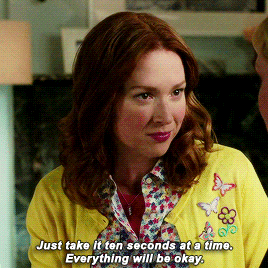If you’re an average college student, then you know only too well the struggles of tests, essays and group projects. Graduation probably can’t seem close enough. However, take it from a recent college graduate: life beyond the commencement ceremony isn’t as effortless as you might imagine, at least not for the first few months. While you might have only had a taste of adulthood at the beginning of your college journey, post-graduation offers the entire course.
Every stage has pros and cons, of course, but savor a few comforts of college while they are still familiar and available.
1. The routine.
From your class schedule to class route, the average college student is no stranger to a daily routine. For some of us, “switching it up” could even mean just taking a different staircase, but your destination remains the same. Unless a class gets cancelled, you probably see and come to expect the same sights on rotating days, including the same buildings and bustling students. Then in class itself, even if the material or chapter advances, the overall subject becomes no different. Add the extracurricular activities and regular meetings as well, and your typical college student pretty much lives around the clock.
Sure, this kind of monotony can get tiring after the first week. Having to schedule time for both study and play might also seem like an unfair hassle. After all, seasonal breaks feel so restful because neither alarm clocks nor academic responsibilities control us for at least a week. However, if you don’t yet have a set job or plan for after graduation, a lack of routine might leave you feeling lost. Almost every position offers a set schedule, but that gap in between college and career can make even the least nostalgic graduate miss the first day of senior or even freshman year.
2. The people.
Depending on your class sizes, you might not become friends or acquaintances with everyone else on the roster. However, it only takes a few days after everyone finalizes regular seating to notice and anticipate the students who sit near you. The first day of class might only include a little friendly conversation, but your deskmate could become the only reason you survive or attend that period. By the time you prepare yourself for the next semester’s change of classes and, therefore, classmates, you have likely already exchanged all the necessary contact information. Then you can start the process all over again, maybe even with some familiar faces from the same major.
However, once you run out of semesters, suddenly most people whom you saw on a weekly basis just become online friends. While social media can keep you somewhat up-to-date about former classmates’ lives, it cannot really compensate for face-to-face interaction. In addition to the students and professors whom you regularly passed and politely greeted in the halls, communicating with friends across multiple semesters also becomes rare. Only after graduation do you realize that school friends are not much different from work friends, those whom you probably only see because of the location and convenience. Maintaining these relationships requires more effort once you enter the “real world,” but true friends are worth it.
3. The time.
Even though all the stress and busyness might make it seem like you are getting more headaches than rest, the gap between high school and your career is precious time. Maybe this isn’t the time of your life, but this is a crucial period for deciding who and what you want to be. During college, you learn so much about not only your major and interests but also yourself. In my experience, college especially helped me better understand my personality and character. Of course, most of us attend college for the higher education rather than to delay inevitable entrance into the “real world.” Many dream careers require a college degree, after all. The majority of students also work at least one job in addition to attending classes. However, being able to extend school life can provide traditional students with a few years of significant self-discovery.
When time runs out at graduation, though, the pressure to succeed immediately intensifies. However, most of this uneasiness results from our own and others’ expecting us to possess the dream life after only a week or two of being a college graduate. Not only is that unrealistic, but that’s also impossible. If success comes from trial and error, the average graduate has to be ready to stumble and sometimes just stand still. Feeling aimless at the beginning of the rest of your life is hard, but it’s also natural. Expect to fall, but be prepared to get right back up. That’s just part of life.




 man running in forestPhoto by
man running in forestPhoto by 





 "I thought you knew what you signed up for."
"I thought you knew what you signed up for." man and woman in bathtub
Photo by
man and woman in bathtub
Photo by  four women sitting on black steel bench during daytime
Photo by
four women sitting on black steel bench during daytime
Photo by  Uber app ready to ride on a smartphone.
Photo by
Uber app ready to ride on a smartphone.
Photo by  woman in red tank top and blue denim shorts standing beside woman in black tank top
Photo by
woman in red tank top and blue denim shorts standing beside woman in black tank top
Photo by  blue marker on white printer paper
Photo by
blue marker on white printer paper
Photo by  welcome signage on focus photography
Photo by
welcome signage on focus photography
Photo by  woman in white and black striped long sleeve shirt lying on bed
Photo by
woman in white and black striped long sleeve shirt lying on bed
Photo by  pink pig coin bank on brown wooden table
Photo by
pink pig coin bank on brown wooden table
Photo by  person holding iPhone 6 turned on
Photo by
person holding iPhone 6 turned on
Photo by  person holding pencil near laptop computer
Photo by
person holding pencil near laptop computer
Photo by  person slicing vegetable
Photo by
person slicing vegetable
Photo by 
 woman covering mouth with sweater
Photo by
woman covering mouth with sweater
Photo by  person holding remote pointing at TV
Photo by
person holding remote pointing at TV
Photo by  a woman with her arms raised in a crowd of people
Photo by
a woman with her arms raised in a crowd of people
Photo by  "Shocked disbelief: '95% of the population is undateable?'"
"Shocked disbelief: '95% of the population is undateable?'"








